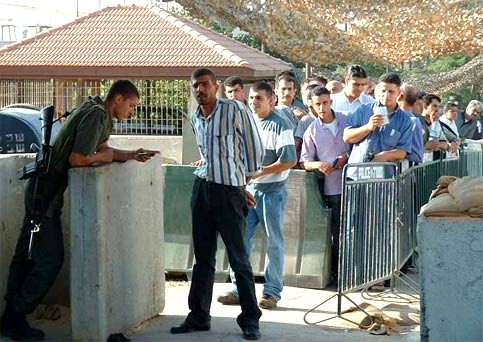MachsomWatch 23 September 2005

An Israeli soldier checks Palestinian IDs at the Al-Ram checkpoint. (Photo: MachsomWatch)
So what did we learn about the Israeli army’s double standard in August, during the evacuation of Israeli settlers from Gaza?
The difference between one form of checkpoint and another
During August, checkpoints operated at the entrance to Gush Katif, to prevent Israelis from infiltrating the region. Complaints were widespread. People waited for hours, an hour and a quarter, to cross over (though infiltrators got through without let or hindrance).
A closure was imposed in the Occupied Territories throughout August (a Jewish holiday = a punishment for Palestinians) to avoid hindering the pullout process. People couldn’t get to work, couldn’t see a doctor unless they were certifiably dying, nor could they get to a mosque or a church for prayers.
Gush Katif’s residents complained bitterly about having to present identity cards at the entrance to the region. Meanwhile, in Jerusalem:
‘On the way to the former pishpash gate (Abu Dis, on the Jericho road). The metal sheets at the gate that have been welded closed are still lifted up at the bottom right-hand corner, and people crawl through to get to work. Two soldiers stand in that corner, like a ‘reception committee’, waiting to check their papers’ (Abu Dis, 19 August 2005).
‘In order to get through this crossing, people must physically crawl through the triangular opening, and then a hand is extended for their papers, then the features appear, and afterward it’s confirmed that they are soldiers. Once they’re entirely through, the pleading and explanations begin’ (Abu Dis, 28 August 2005).
‘There was a nauseating smell from a carcass or rotting garbage and the air was suffused with dust from the quarry… the endless roads, prohibited for use by Palestinians, the barbed wire and walls - a fitting backdrop to human suffering’ (Beit Iba, 30 August 2005).
The difference between one form of expulsion and another
In Gush Katif, the settlers were informed two years in advance of the date of their evacuation. And the Palestinians? Have they ever been informed upfront? Buses were ready to transport the settlers out of Gush Katif. Is anyone familiar with the bus company that drives expelled Palestinians to hotels? Does anyone know about the close psychological assistance given to Palestinians - the old, children, and women - evicted from their homes at the dead of night, at rifle-point?
The difference between one form of demolition and another
Where were the containers for hundreds of Palestinians whose houses - and their contents - were demolished as they stood and watched helplessly? And what about using children under the occupation, and using children during an evacuation?
Or the difference between the Gush Katif evacuees and checkpoint soldiers? Israelis were charmed by the considerate behaviour of the soldiers and police officers towards the people evacuated from their homes during the pullout process. But how do they behave towards Palestinians?
Soldiers mockingly asked ‘kif halak?’ (“How are you?” in Arabic) accompanied with jokes in Hebrew (Huwwara, 6 August 2005).
‘There were many shouts of ‘Irja lawara’ (get back) and ‘wahad wahad’ (one at a time). At the checking facility, the soldier on guard, after a volley of ‘Irja lawara’ with the young men facing him, gestures to them, finger on his mouth, to quieten down’ (Huwwara, 31 August 2005).
‘A lone soldier at the post asks a Palestinian, while examining his ID, how many children he has. ‘Every year another child, huh? Do it as long as you can…’ accompanied with unmistakably lewd hand-gestures one could not misinterpret (Huwwara, 28 August 2005) ‘Fifteen cars were waiting to be checked but the soldiers were busy with their own affairs and did not hurry. An elderly man who spoke Hebrew fluently asked the soldier why there was a delay and was answered ‘Phone the Ministry of Defence and tell them to increase the budget and send more soldiers’. The man replied that both he and the woman soldier were standing doing nothing, to which the reply was ‘Wait patiently. In Europe everyone waits. I’m Europe, and I know’ (Checkpoint 300, 28 August 2005)
So what did we learn during the disengagement? That when the IDF high command sends down a message calling for ‘determination and sensitivity’, the message gets through and human rights are not violated.
Why doesn’t the same happen at checkpoints across the West Bank?
MachsomWatch is an Israeli women’s organization that monitors one of the gravest aspects of the Occupation - the restriction of free movement by Palestinians in the Occupied Territories. This report was the “MachsomWatch Summary - August 2005” and was adapted and slightly edited by EI for clarity. Daily reports in English are available at Machsom Watch’s website at www.machsomwatch.org